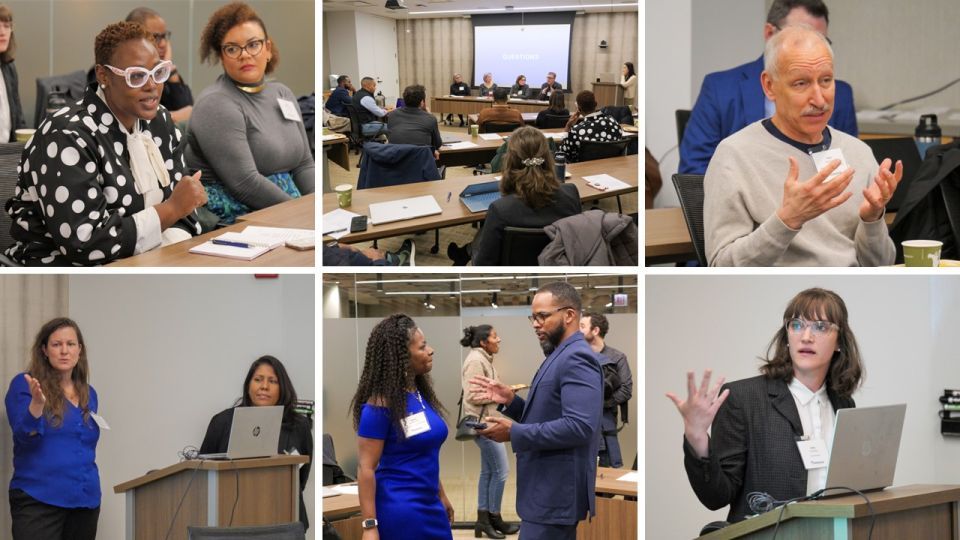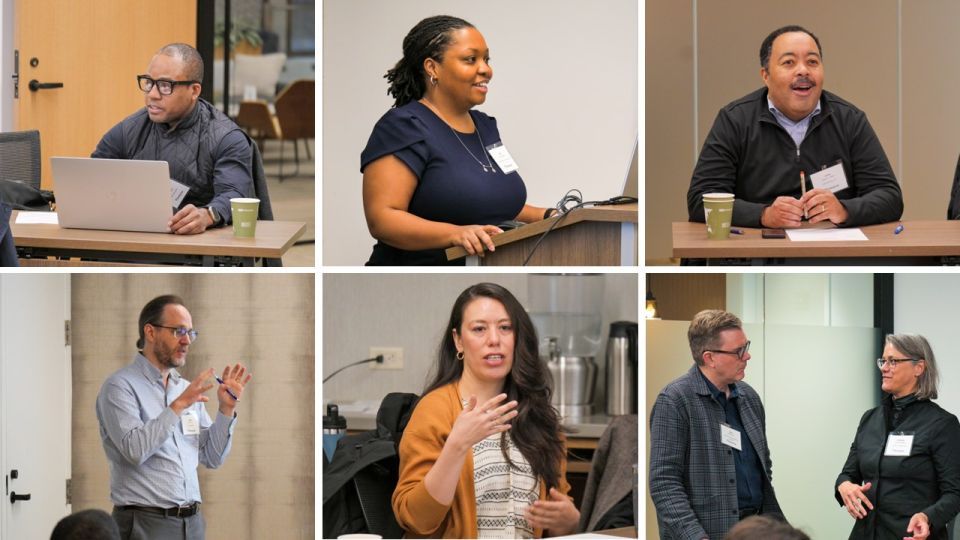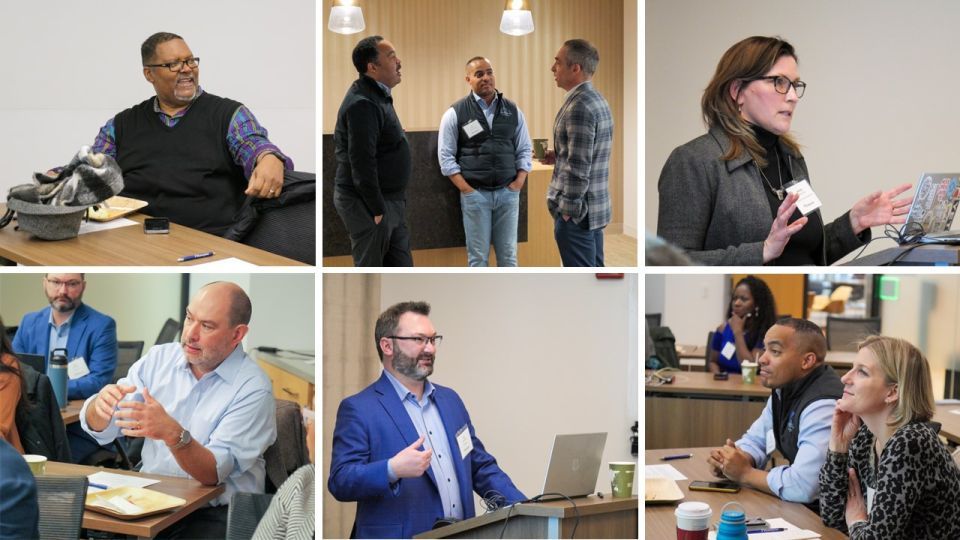
On Thursday, April 4, Enterprise convened its Central Midwest Equitable Path Forward (EPF) cohort in Chicago, where they heard from developers, consultants, funders, and other subject-matter experts on strategies to advance environmentally sustainable and healthy homes.
Enterprise’s EPF program is a national five-year initiative to help dismantle the legacy of racism in housing by supporting housing providers of color in growing and scaling their businesses through flexible capital, technical assistance, and capacity-building activities. According to the 2023 Annual Report, EPF’s developer partners have seen an 8% average increase in staff since the program began, with nearly 7,400 homes created or currently in development.
Enterprise launched the Central Midwest EPF cohort in August 2023, comprised of nine mission-aligned developers based in Illinois, Indiana, Missouri, and Wisconsin, to foster connections with each other and local development partners. To date, Enterprise has provided over $8M in capital products and technical assistance grants to this cohort.

The Nuts and Bolts of Sustainable Development
The first panel, Design and Sustainability in Practice, highlighted the benefits of sustainable design to resident well-being and discussed the range of sustainability measures developers should consider in their new construction projects, renovations, and retrofits. Panelists touched on which partners can help developers take projects from concept to completion and how to develop a roadmap for implementation. Panelists and EPF participants also discussed the benefits, requirements, and common roadblocks to obtain key green certifications, including Enterprise Green Communities.
Panelists included:
- Catherine Baker, founder of Nowhere Collaborative
- Ellen Bell, Senior Director of High-Performance Buildings, Elevate
- Michelle Dusseau Diller, Senior Program Director, Policy and Building Resilient Futures, Enterprise
- Kevin Hall, Assistant Director for Design, Construction and Regulatory Compliance, Illinois Housing Development Authority
During this session, EPF participants cited the need for additional funding to engage residents and assist with planning and implementation, which can be overlooked line items in a project’s development budget. Ongoing education is critical to ensure staff have the knowledge to address challenges with new building systems and maintain ongoing operations. Additionally, accessible information that demonstrates energy savings and building performance can help developers better understand which sustainability features are worth pursuing based on property and resident needs.

Show me the Money
During the second panel, Structuring Your Deal: Green Building Financing, participants learned how to access available financing, grants, and tax credits to pay for key sustainability measures highlighted during the first panel. This included which funding resources braid well together in the capital stack and how to take advantage of the many new funding resources from the federal Inflation Reduction Act (IRA). Panelists also discussed the importance of working closely with the team – the architect, general contractor, accountant, and consultant – to avoid increasing project costs at key points of the design and construction phase.
Panelists included:
- Michelle Dusseau Diller, Senior Program Director, Policy and Building Resilient Futures, Enterprise
- Jamie Carr, Partner, Eco Achievers
- Emily Rhea, Partner, Eco Achievers
- Dirk Wallace, Partner, Novogradac
EPF participants raised the need for technical assistance to help developers navigate the multiple sources of funding, apply for new funding sources, juggle varying timelines, and understand any changing guidelines of existing programs across different public agencies.
During the convening, Enterprise announced that Power Forward Communities, a coalition co-led by Enterprise along with LISC, Rewiring America, Habitat for Humanity, and United Way, was awarded a $2 billion National Clean Investment Fund (NCIF) grant from the US Environmental Protection Agency (EPA). Enterprise and the Power Forward Communities coalition will offer a range of flexible financing products to both our developer partners and peer community lenders, as well as provide technical assistance offerings to developers of multifamily affordable housing.
Case Study Showcase
|
Image

|
Image

|
| Corcoran Place Apartments. Source: Preservation of Affordable Housing | |
The last session focused on case study projects to highlight varied sustainability approaches and discuss successes and lessons learned.
Panelists included:
- AJ Patton, CEO and Founder, 548 Development
- Molly Ekerdt, Vice President, Chicago, Preservation of Affordable Housing (POAH)
- Claudia Rodriguez, Senior Construction Project Manager, Chicago, POAH
- Maria Cecilia Quiñones Peña, High Performance Buildings Associate Director, Elevate
AJ Patton shared how he has integrated solar and clean energy technology as a core component of his development model and demonstrated which local and state solar programs were critical to the success of his development projects. Integral to 548 Development’s development model is ensuring local communities can reap the benefits of the green transition and participate in the green economy. AJ demonstrated how 548 Development has advanced local hiring, equitable workforce development, and community infrastructure – including community solar and electric vehicle charging stations – in the neighborhoods where 548 Development’s projects are located.
Molly Ekerdt and Claudia Rodriguez shared the energy efficiency upgrades planned for POAH’s Corcoran Place Apartments, two properties with 94 affordable units for older adults in Austin, Chicago. Corcoran Place Apartments was awarded funding from the Department of Housing and Urban Development’s (HUD) Green and Resilience Retrofit Program (GRRP), a new program created by the IRA that provides grants and soft loans to affordable housing owners to make sustainable and climate resilience retrofits in HUD Section 8, 202, and 811 properties.
Ekerdt and Rodriguez also discussed how POAH developed its staff capacity to quickly respond to opportunities like GRRP. Across five states, POAH has been awarded GRRP funding to renovate 928 units in 11 properties.
Maria Cecilia Quiñones Peña highlighted Elevate’s role in helping a developer partner plan for and implement decarbonization measures in Lake Grove Village Apartments, an affordable housing development in Chicago’s Bronzeville neighborhood. For this property, Elevate conducted an assessment to identify key decarbonization measures, including energy efficiency, electrification, and renewable energy solutions that equitably provide positive impacts for both the developer and residents . Elevate also identified addition project financing, led the bid procurement process, and managed the construction process as the developer's technical advisor.
What’s Next
Enterprise will continue to support our Central Midwest Equitable Path Forward partners in the coming year through capacity-building training sessions and technical assistance opportunities. Together with our Power Forward Communities coalition members, Enterprise will work to connect our EPF partners in the Midwest and nationally to financing and technical support to create affordable, sustainable, and healthy homes.
Learn more about the Enterprise Chicago market and sign up for our newsletter.
Learn more about Power Forward Communities at our website, where you can sign up for updates, ask questions, and complete an intake form.
This event was made possible by generous support from the Federal Home Loan Bank of Chicago.